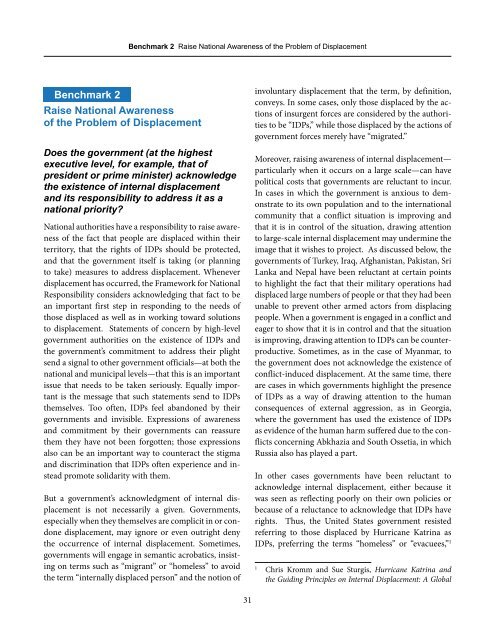From Responsibility to Response: Assessing National - Brookings
From Responsibility to Response: Assessing National - Brookings
From Responsibility to Response: Assessing National - Brookings
You also want an ePaper? Increase the reach of your titles
YUMPU automatically turns print PDFs into web optimized ePapers that Google loves.
Benchmark 2<br />
Raise <strong>National</strong> Awareness<br />
of the Problem of Displacement<br />
Benchmark 2 Raise <strong>National</strong> Awareness of the Problem of Displacement<br />
Does the government (at the highest<br />
executive level, for example, that of<br />
president or prime minister) acknowledge<br />
the existence of internal displacement<br />
and its responsibility <strong>to</strong> address it as a<br />
national priority?<br />
<strong>National</strong> authorities have a responsibility <strong>to</strong> raise awareness<br />
of the fact that people are displaced within their<br />
terri<strong>to</strong>ry, that the rights of IDPs should be protected,<br />
and that the government itself is taking (or planning<br />
<strong>to</strong> take) measures <strong>to</strong> address displacement. Whenever<br />
displacement has occurred, the Framework for <strong>National</strong><br />
<strong>Responsibility</strong> considers acknowledging that fact <strong>to</strong> be<br />
an important first step in responding <strong>to</strong> the needs of<br />
those displaced as well as in working <strong>to</strong>ward solutions<br />
<strong>to</strong> displacement. Statements of concern by high-level<br />
government authorities on the existence of IDPs and<br />
the government’s commitment <strong>to</strong> address their plight<br />
send a signal <strong>to</strong> other government officials—at both the<br />
national and municipal levels—that this is an important<br />
issue that needs <strong>to</strong> be taken seriously. Equally important<br />
is the message that such statements send <strong>to</strong> IDPs<br />
themselves. Too often, IDPs feel abandoned by their<br />
governments and invisible. Expressions of awareness<br />
and commitment by their governments can reassure<br />
them they have not been forgotten; those expressions<br />
also can be an important way <strong>to</strong> counteract the stigma<br />
and discrimination that IDPs often experience and instead<br />
promote solidarity with them.<br />
But a government’s acknowledgment of internal displacement<br />
is not necessarily a given. Governments,<br />
especially when they themselves are complicit in or condone<br />
displacement, may ignore or even outright deny<br />
the occurrence of internal displacement. Sometimes,<br />
governments will engage in semantic acrobatics, insisting<br />
on terms such as “migrant” or “homeless” <strong>to</strong> avoid<br />
the term “internally displaced person” and the notion of<br />
31<br />
involuntary displacement that the term, by definition,<br />
conveys. In some cases, only those displaced by the actions<br />
of insurgent forces are considered by the authorities<br />
<strong>to</strong> be “IDPs,” while those displaced by the actions of<br />
government forces merely have “migrated.”<br />
Moreover, raising awareness of internal displacement—<br />
particularly when it occurs on a large scale—can have<br />
political costs that governments are reluctant <strong>to</strong> incur.<br />
In cases in which the government is anxious <strong>to</strong> demonstrate<br />
<strong>to</strong> its own population and <strong>to</strong> the international<br />
community that a conflict situation is improving and<br />
that it is in control of the situation, drawing attention<br />
<strong>to</strong> large-scale internal displacement may undermine the<br />
image that it wishes <strong>to</strong> project. As discussed below, the<br />
governments of Turkey, Iraq, Afghanistan, Pakistan, Sri<br />
Lanka and Nepal have been reluctant at certain points<br />
<strong>to</strong> highlight the fact that their military operations had<br />
displaced large numbers of people or that they had been<br />
unable <strong>to</strong> prevent other armed ac<strong>to</strong>rs from displacing<br />
people. When a government is engaged in a conflict and<br />
eager <strong>to</strong> show that it is in control and that the situation<br />
is improving, drawing attention <strong>to</strong> IDPs can be counterproductive.<br />
Sometimes, as in the case of Myanmar, <strong>to</strong><br />
the government does not acknowledge the existence of<br />
conflict-induced displacement. At the same time, there<br />
are cases in which governments highlight the presence<br />
of IDPs as a way of drawing attention <strong>to</strong> the human<br />
consequences of external aggression, as in Georgia,<br />
where the government has used the existence of IDPs<br />
as evidence of the human harm suffered due <strong>to</strong> the conflicts<br />
concerning Abkhazia and South Ossetia, in which<br />
Russia also has played a part.<br />
In other cases governments have been reluctant <strong>to</strong><br />
acknowledge internal displacement, either because it<br />
was seen as reflecting poorly on their own policies or<br />
because of a reluctance <strong>to</strong> acknowledge that IDPs have<br />
rights. Thus, the United States government resisted<br />
referring <strong>to</strong> those displaced by Hurricane Katrina as<br />
IDPs, preferring the terms “homeless” or “evacuees,” 1<br />
1 Chris Kromm and Sue Sturgis, Hurricane Katrina and<br />
the Guiding Principles on Internal Displacement: A Global

















